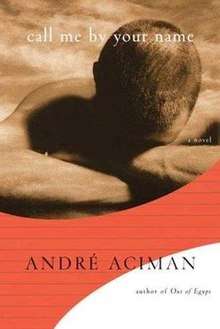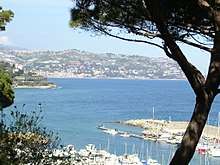Call Me by Your Name (novel)
Call Me by Your Name is a 2007 novel by American writer André Aciman that centers on a blossoming romantic relationship between an intellectually precocious and curious 17-year-old American-Italian Jewish boy named Elio Perlman and a visiting 24-year-old American Jewish scholar named Oliver in 1980s Italy. The novel chronicles their summer romance and the 20 years that follow. A sequel to the novel, Find Me, was released in October 2019.
 first edition cover | |
| Author | André Aciman |
|---|---|
| Audio read by | Armie Hammer |
| Country | United States |
| Language | English |
| Publisher | Farrar, Straus and Giroux |
Publication date | 2007 |
| Media type | Print (Hardcover and Paperback) |
| Pages | 256 pp |
| ISBN | 0-374-29921-8 |
| OCLC | 66463617 |
| 813/.6 | |
| LC Class | PS3601.C525 C35 2007 |
| Followed by | Find Me |
Plot summary
The narrator, Elio Perlman, recalls the events of the summer of about 1987, when he was seventeen and living with his parents in Italy. Each summer, his parents would take in a doctoral student as a house guest for six weeks, who would revise a book manuscript while assisting his father with academic paperwork. Elio resents the tradition, as it requires him to vacate his bedroom so the guest can use it for the duration of their stay.
Oliver, the guest for the summer, is carefree and detached—a stark contrast to Elio's introversion. Elio selected Oliver as a guest in the hopes of "instant affinities" between them and acts as his tour guide, though Elio's attempts to impress Oliver are met with indifference. When Oliver grabs Elio's arm after a tennis match, Elio retracts in fear. Though Elio recognizes his own bisexuality and his attraction to Oliver—he is particularly excited by his discovery that Oliver is Jewish, seeing it as a bond between them—he doubts that Oliver reciprocates his feelings.
One day, Elio sneaks into Oliver's room, and masturbates while wearing Oliver's swimming trunks. Later, Elio confesses his attraction to Oliver, and they kiss on a berm where Claude Monet had supposedly painted some of his pictures. When Elio touches Oliver's penis through his clothes, Oliver pushes him away.
Oliver and Elio grow distant in the subsequent days. Elio begins an affair with Marzia, a local girl around his own age. Seeking reconciliation, Elio slips a note under Oliver's bedroom door, with a plan to meet at midnight. At midnight, Elio enters Oliver's room, where they have sex. Elio feels guilty about the encounter, and decides that he cannot continue his relationship with Oliver.

The next morning, Oliver wears Elio's bathing suit to breakfast—mirroring Elio's earlier fetishistic behavior—and later performs oral sex on Elio. Elio realizes that his attraction to Oliver persists, and that he wishes to continue their relationship. Elio visits Marzia's house, and the two have sex; in the afternoon he masturbates with a cut peach, and ejaculates inside of it. Oliver later visits Elio's room, eats the peach and its contents, and again has sex with Elio.
Before returning to the United States, Oliver decides to spend three days in Rome, where he is accompanied by Elio. Upon returning from the trip, Elio is saddened to find that his belongings have already been returned to his original bedroom, and that all traces of Oliver's visit have vanished. Elio has a discussion with his father, who says that he approves of the friendship (and relationship) between Elio and Oliver.
That Christmas, Oliver again visits the Perlman family, and announces that he intends to marry next summer. Oliver and Elio fall out of touch, and do not communicate with each other for many years.
Fifteen years later, Elio visits Oliver in the United States, where Oliver is now a professor. Elio is unwilling to meet Oliver's wife and children, admitting that he still feels attraction towards Oliver and jealousy towards his new family. Oliver admits that he has followed Elio's academic career, and shows him a postcard that he brought with him when he left Italy and has kept over the years. During a final meeting at a bar, Elio and Oliver muse that people can lead two parallel lives—one in reality, and one a fantasy that is denied to them by external forces.
Twenty years after their first meeting and one year before the narrator's present, Oliver visits Elio's family home in Italy. They recall their time together; Elio informs Oliver that his father has died, and that he has spread his ashes all over the world. The novel concludes with Elio, as the narrator, remarking to the reader that if Oliver remembered everything as he says he did, he should once more "look me in the face, hold my gaze, and call me by your name."
Reception
Reviews
Call Me by Your Name received widespread acclaim from literary critics, with review aggregator Book Marks reporting zero negative and zero mixed reviews among 10 total, indicating "rave" reviews.[1]
Reviewing for The New York Times, Stacey D'Erasmo called the novel "an exceptionally beautiful book".[2] Writing in The New Yorker, Cynthia Zarin said, "Aciman’s first novel shows him to be an acute grammarian of desire".[3] In The Washington Post, Charles Kaiser said, "If you have ever been the willing victim of obsessive love—a force greater than yourself that pulls you inextricably toward the object of your desire—you will recognize every nuance of André Aciman's superb new novel, Call Me by Your Name."[4]
Sales
According to Nielsen BookScan, as of 19 February 2018, the book has sold 33,376 copies for £252,675 in the United Kingdom. In early November 2017, the book went from 618 copies sold to 1,164, an 88% jump in volume week on week. It reached 2,012 copies sold for the week ending February 3.[5]
Awards
At the 20th Lambda Literary Awards, the novel won the award for Gay Fiction.[6]
Media
Film adaptation
A film adaptation directed by Luca Guadagnino and starring Timothée Chalamet as Elio, Armie Hammer as Oliver, and Michael Stuhlbarg as Elio's father was released on November 24, 2017, in the United States to critical acclaim.[7] At the 90th Academy Awards, it was nominated for Best Picture, Best Actor (Chalamet), Best Original Song ("Mystery of Love" by Sufjan Stevens), and Best Adapted Screenplay (James Ivory), winning the latter.[8][9]
Audiobook
An audiobook read by Armie Hammer was published in 2017 by Macmillan Publishers.[10]
Sequel
On December 3, 2018, Aciman announced on his Twitter account that he was writing a sequel to Call Me by Your Name.[11] On March 20, 2019, Aciman announced the sequel's title, Find Me. It was published by Farrar, Straus and Giroux on October 29, 2019.[12]
See also
- List of fiction works made into feature films (0–9 and A–C)
References
- "Book Marks reviews of Call Me By Your Name". Book Marks. Retrieved 22 September 2019.
- D’Erasmo, Stacey (25 February 2007). "Call Me by Your Name - By André Aciman - Books - Review". The New York Times. Retrieved 15 August 2016.
- Zarin, Cynthia (February 19, 2007). "Briefly Noted". The New Yorker. Retrieved 15 August 2016.
- Kaiser, Charles (22 March 2007). "Love That Knows No Boundaries". The Washington Post. Retrieved 15 August 2016.
- Wood, Heloise (February 19, 2018). "BAFTA gong for Call Me By Your Name". The Bookseller. Archived from the original on July 16, 2018.
- "20th Annual Lambda Literary Awards Winners and Finalists". Retrieved 5 June 2016.
- "Michael Stuhlbarg, Armie Hammer & More Leading Luca Guadagnino's 'Call Me By Your Name'". The Film Stage. 23 May 2016. Retrieved 24 May 2016.
- Coggan, Devan (23 January 2018). "Oscar nominations 2018: See the full list". Entertainment Weekly. Archived from the original on 23 January 2018. Retrieved 6 March 2018.
- Chow, Andrew R. (4 March 2018). "Oscars 2018: The Winners". The New York Times. Archived from the original on 5 March 2018. Retrieved 6 March 2018.
- http://ew.com/books/2017/09/06/armie-hammer-call-me-by-your-name-audiobook/
- @aaciman (3 December 2018). "I would actually love a sequel to Call Me by Your Name. In fact I am writing one" (Tweet) – via Twitter.
- Harris, Hunter (2019-03-20). "André Aciman Is Officially Writing a Call Me by Your Name Sequel". www.vulture.com. Retrieved 2019-03-21.